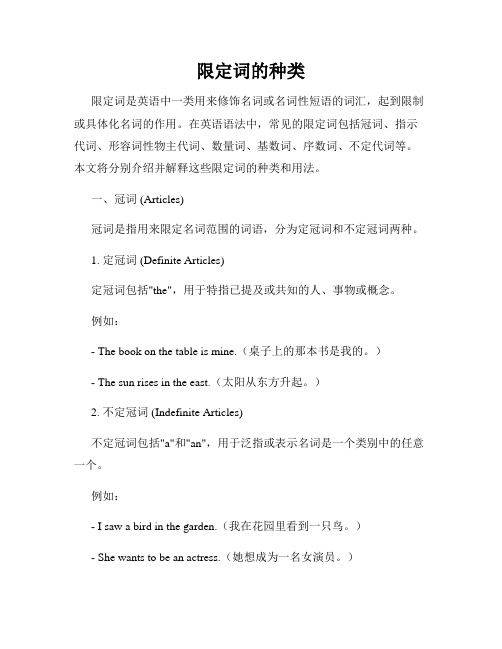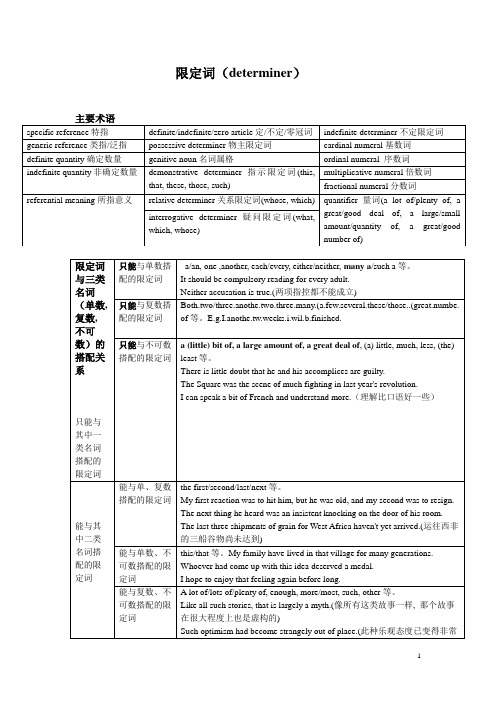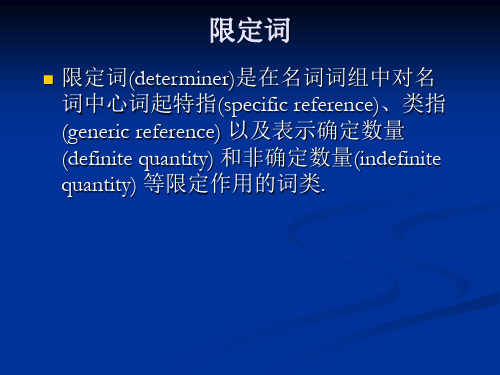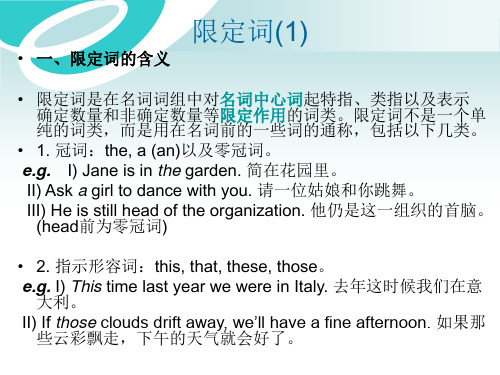英语语法之 限定词(一)
- 格式:doc
- 大小:29.50 KB
- 文档页数:3

限定词的种类限定词是英语中一类用来修饰名词或名词性短语的词汇,起到限制或具体化名词的作用。
在英语语法中,常见的限定词包括冠词、指示代词、形容词性物主代词、数量词、基数词、序数词、不定代词等。
本文将分别介绍并解释这些限定词的种类和用法。
一、冠词 (Articles)冠词是指用来限定名词范围的词语,分为定冠词和不定冠词两种。
1. 定冠词 (Definite Articles)定冠词包括"the",用于特指已提及或共知的人、事物或概念。
例如:- The book on the table is mine.(桌子上的那本书是我的。
)- The sun rises in the east.(太阳从东方升起。
)2. 不定冠词 (Indefinite Articles)不定冠词包括"a"和"an",用于泛指或表示名词是一个类别中的任意一个。
例如:- I saw a bird in the garden.(我在花园里看到一只鸟。
)- She wants to be an actress.(她想成为一名女演员。
)二、指示代词 (Demonstrative Pronouns)指示代词指代特定的人、事物或位置,并且根据离说话人的距离分为远指和近指两种。
1. 远指代词远指代词包括"that"和"those",用于指代离说话人较远的事物或人们。
例如:- That is a beautiful sunset.(那是一个美丽的日落。
)- Look at those flowers over there.(看看那边的花。
)2. 近指代词近指代词包括"this"和"these",用于指代离说话人较近的事物或人们。
例如:- This is my new car.(这是我的新车。
)- These are my friends.(这些是我的朋友。

限定词(determiner)限定词的先后顺序: 前位---中位---后位(一个名词中心词之前不可并用两个前位限定词或两个中位限定词)冠词的表意功能(1)The ten of them have passed the final examination.Ten of them have passed the final examination.Ten of the (these/his) students have passed the final examination.(2)They asked to stop counting presidential votes for a second time.(3)Every boy and every girl___(have) his merits.Every young man, young lady,and child ___(be) requested to take part.Many a person___(be) going to the take the test.(4)Other or anotherCalifornia covers a large area than __________state except Alaska and Texas.Out of the three foreign guests, one is from Frankfurt, ______two are from Vienna.. Don'.los.heart.Hav.___try.There's room for _________people in the back of the bus.(5). ing.We'l.hav.____.five-da.holiday.(6)冠词的用法Who is ___captain of your team?. Mr.Reaga.wa.electe.___Presiden.o.th.Unite.State.i.1980.Charles Dickens,__author of David Copperfield, was a distinguished English novelist.As ____physician, he does not deserve much praise.He was covered with snow from ___head to __foot.The relation between ___teacher and ___student is excellent.This room serves the triple purpose of ___study, ___bedroom and ____sitting room. The old man was sitting in a chair, ___pipe in ___hand.He sat at ___ table, ___coat off, ___head down, and __pen in ___hand.What kind of ___man is he?What sort of ___book do you want?The work is ____pleasure to me.She has developed ___love for labour.Physics is ____ science.He spoke with _____ enthusiasm which inspired us all.Do you like ___ music of ___film?Phonetics is ____science of speech sounds。


限定词的用法限定词是英语中的一类词汇,它们在句子中的作用是限制或修饰名词,以便更准确地表达出句子的意思。
限定词的使用是英语语法中的一个重要部分,它们的正确使用可以使句子更加清晰、简洁和流畅。
本文将详细介绍限定词的用法。
一、限定词的定义限定词是指用来限定或修饰名词的词汇,它们包括冠词、指示代词、不定代词、数词、序数词、形容词性物主代词、名词性物主代词、疑问代词和关系代词等。
二、冠词的用法冠词是限定词中最常用的一种,它分为定冠词和不定冠词。
1. 定冠词“the”的用法定冠词“the”用来指特定的人或物,或特指某个已经被提到过的人或物。
例如:The boy is playing football.(那个男孩正在踢足球。
)The book on the table is mine.(桌子上的那本书是我的。
) 2. 不定冠词“a/an”的用法不定冠词“a/an”用来指任何一个人或物,或表示数量为一。
其中,“a”用于辅音音素的词前,而“an”用于元音音素的词前。
例如: I need a pen.(我需要一支笔。
)She is an English teacher.(她是一名英语老师。
)三、指示代词的用法指示代词用来指示某个人或物的位置或身份,分为“this”、“that”、“these”和“those”四种。
1. “this”和“that”的用法“this”用来指示离说话人较近的人或物,而“that”用来指示离说话人较远的人或物。
例如:This is my car.(这是我的车。
)That is his book.(那是他的书。
)2. “these”和“those”的用法“these”用来指示离说话人较近的复数人或物,而“those”用来指示离说话人较远的复数人或物。
例如:These are my friends.(这些是我的朋友。
)Those are their bags.(那些是他们的包。
)四、不定代词的用法不定代词用来指代不确定的人或物,包括“some”、“any”、“no”、“none”、“every”、“each”、“either”和“neither”等。


限定词知识点总结一、冠词冠词是英语中最基本的限定词,主要分为定冠词“the”和不定冠词“a”、“an”。
定冠词用于特指某一特定的事物,而不定冠词则用于泛指某一类事物。
下面我们将分别介绍定冠词和不定冠词的用法。
1. 定冠词“the”定冠词“the”用法非常灵活,主要有以下几种情况:(1)指特指特定的事物或人。
例如:The book on the desk is mine.(桌子上的那本书是我的。
)(2)用在单数或不可数名词前表示整体或泛指某一类事物。
例如:The water is cold.(水很冷。
)(3)用在序数词、形容词最高级前表示最特定的意思。
例如:This is the best book I have ever read.(这是我读过的最好的书。
)(4)用在乐器名词前表示某一个唯一的乐器。
例如:She plays the piano very well.(她钢琴弹得很好。
)2. 不定冠词“a”、“an”不定冠词“a”用于辅音开头的词前,而不定冠词“an”用于元音开头的词前。
不定冠词的主要用法如下:(1)用于泛指某一类事物。
例如:I need a pen.(我需要一支笔。
)(2)用于表示职业、身份、国籍等身份识别的名词前。
例如:He is a teacher.(他是一名教师。
)(3)用于表示数量意义上的“一个”。
例如:I have an apple.(我有一个苹果。
)(4)用于表示某一种类的事物。
例如:A dog is a faithful animal.(狗是忠诚的动物。
)二、指示代词指示代词是用来指示人或物的词语,常见的指示代词有this、that、these和those等,它们在句子中具有指示、引导和修饰作用。
下面我们将分别介绍指示代词的具体用法。
1. this和thatthis和that分别表示“这个”和“那个”,在句子中主要有以下几种用法:(1)用于指示近处或者说话者手中的事物。
限定词(一)限定词用来限定名词所指的范围,主要包括冠词、不定代词、指示代词、数词等。
本章节主要讨论冠词的用法。
冠词是一种虚词,本身不能独立使用。
英语中,冠词包括不定冠词(a/ an)、定冠词(the) 和零冠词三种。
一、不定冠词的主要用法1. a和an 是泛指限定词,用于单数可数名词前,泛指人或物。
在首次提及的人或物前,a或an 一般表示数量“一”。
a用于以辅音开头的名词前:a piece,a language,a university。
an用于以元音开头的名词前:an example,an art exhibition (展览会),an early train,an honest politician, an hour。
e.g. I) It has been a rewarding lecture.II) I work for Sony Electric, an electronics company. 我在一家电子公司――索尼电器工作。
2. a和an也可用在可数名词前表示一类人或物。
e.g. I) A friend is someone who chooses and is chosen.II) Lend me a novel, will you?3. a和an用在某些物质名词前表示一阵、一份、一类、一场、一种等。
e.g. I) All I had for lunch is a yogurt. 中饭我只吃了一杯酸奶。
II) What the earth needs now is a rainfall, 目前地球所需要的是一场雨。
二、定冠词the的意义和用法1. 与名词连用特指某个人或物,或谈话双方熟知的彼此心照不宣的人或物。
e.g. I) Did you go to the opening ceremony? 你有没有参加开幕式?II) The lion is a fierce (凶猛的) animal. (相当于A lion is a fierce animal.或Lions are fierce animals.)【注】下面三句中的斜体部分就不能互换:I) Who invented the camera? (指类别)II) Who had a camera? (指同类中的任何一个)III) Who produced cameras? (指这一类中的所有个体)2. 用在表示独一无二的或被认为是唯一的名词前。
e.g. the sun, the earth, the world, the universe, the Equator (赤道), etc.【注】如果sun, moon, sky等词前有一描绘性定语,有时也可以加不定冠词。
e.g. A pale moon hung low in the sky. 一轮苍白的月亮挂在天边。
3. 用在序数词及形容词, 副词最高级前。
e.g. I) The fittest survives. 适者生存。
II) He is the most diligent (勤奋的) student in our class.【注】在序数词前有时也不用the,而用a/an,其含义为:“又一个, 又一次,还有一个”。
e.g. He orders a second glass of beer.4. 用在only, main, sole, same等前。
e.g. I) He is the only student who got straight As in all subjects. 他是唯一一个门门功课都得优秀的学生。
II) At the same time, it is important that you master English.5. 用在表示海洋、河流、山脉、群岛、某些国名、某些组织机构、报纸、书籍、会议、条约、信仰等名词前。
e.g. the Atlantic,the Y angtze River,the Caribbean,the Sahara,the Alps,the grand Canal,the USA,the Philippines,the Netherlands,the Y ellow Sea。
但下列名词前不用冠词:Life 生活周刊,Time (时代周刊),News Week (新闻周刊),Congress (国会),Parliament (议会) 等等。
6. 在大学名称前一般不用定冠词the,但有of介词短语修饰时,需用the。
e.g. Zhejiang University, Oxford University, the University of North Carolina.7. 表示湖泊的名词前一般不加定冠词, 但中国湖泊名词前常常带定冠词。
ke Baikal,Silver Lake,the Poyang Lake,the West Lake.8. 用在复数姓氏名词前, 表示“一家人”。
e.g. the Smiths,the Johnsons。
9. 用在乐器名称前。
e.g. play the guitar, play the violin.10. 当cinema, movies, theater, radio等名词用于表示“看电影、看戏、听收音机”时,一般要用定冠词the。
e.g. I) Would you like to go to the cinema/ go to the movies with me tonight?II) I heard the news on the radio.【注】television用于表示“看电视”时不用the。
但指“电视机”时则用the。
e.g. I) I like watching television very much.II) Can you turn on the television, please? (= the television set)三、零冠词零冠词,即不用冠词,主要表示名词的的泛指和未确定特指概念,主要用于以下几种情况。
1. 名词前有物主代词、指示代词、疑问代词、不定代词等限定词时用零冠词。
2. 在表示人名、地名的专有名词前(不包括普通名词构成的专有名词)用零冠词。
3. 一日三餐的名词如breakfast, lunch, dinner, supper等前常用零冠词。
但是如果前面有形容词修饰时用a/an。
在特指某顿饭时也可以加定冠词。
e.g. I) I usually have fast food for lunch.II) He cooked us a delicious dinner.III) How did you like the wedding dinner?4. 日期、月份、季节、日夜、晚上、周年等的名词前用零冠词。
e.g. I) The whole Christmas season stretches from early December to the end of the firstweek in January.II) We have few classes on Saturday.但是,如果被一个限制性定语修饰,或表示一段特定的时间,它前面就得加定冠词。
e.g. I) The building was completed in the autumn of 1998.II) I lived in Paris for a month in the spring of 2005.5. 运动、游戏、颜色、语言、学科等名词前用零冠词。
e.g. I) During my leisure time (闲暇时间) I like playing football.II) He majors in physics.6. 用作同位语或主语补足语说明独一的身份、职位、头衔或表示某种抽象概念等的名词前用零冠词。
e.g. I) Napoleon was a French soldier who became Emperor (皇帝) of France.II) Beckham is captain of the British national football team. 贝克汉姆是英国国家足球队的队长。
7. 城市名前一般用零冠词,如:New York, Hangzhou等。
8. 由具体转为抽象的名词前通常可用零冠词。
这时该名词所表示的不是具体的建筑物或事物,而是与这些建筑物或事物有关的情形或活动,或表明其用途或作用时。
e.g. I) We had better send him to hospital in no time. (Cf. I am going to the hospital to seemy teacher.II) He finished school at the age of 18. (Cf. He is teaching in a primary school.) 其它的短语还有:go to bed (hospital, church, sea), go by train (bike, boat, plane, bus, car, taxi), in bed ( school, prison, class), at table (school, college, sea)等。
9. 在一些固定短语应用零冠词。
如:at present, in effect, by heart, by mistake, in return, in fear, in haste, in stock, in peace, in trouble, on sale, on board, on guard, out of job, out of reason, out of practice, by chance, in common, in sight of, with ease, catch fire。
【注】在下列短语中用定冠词或零冠词或不定冠词的含义不同:at table (用餐)/at the table (在桌边),in front of (在……的前面) / in the front of (在……的前部),in case of (以防) /in the case of (至于),in charge of (负责) /in the charge of (由……负责),by sea (乘船) /by the sea (在海边),out of question (毫无问题) /out of the question (不可能),in the office (在办公室) /in office (执政),for a moment (片刻) /for the moment (暂时),to a point (在某种程度上) /to the point (中肯),等等。